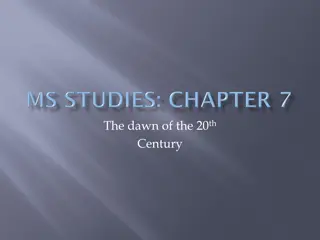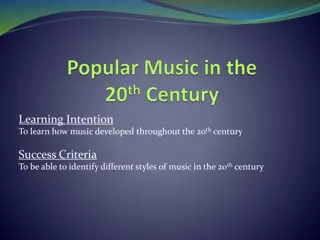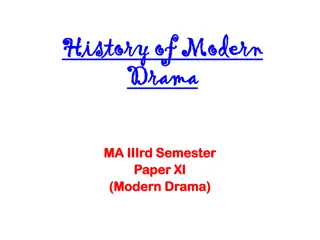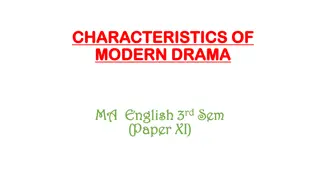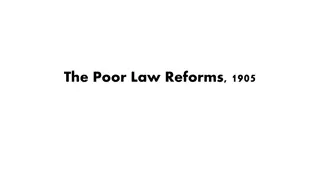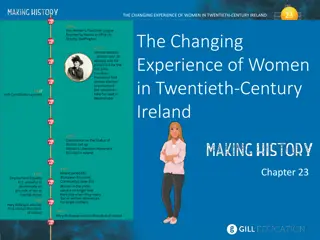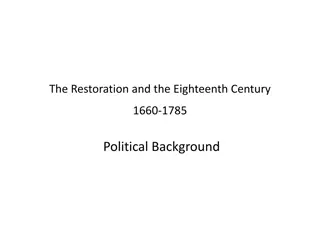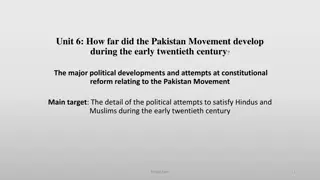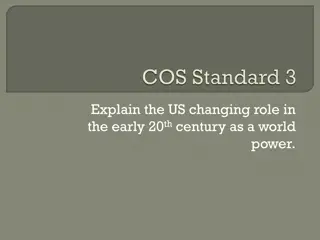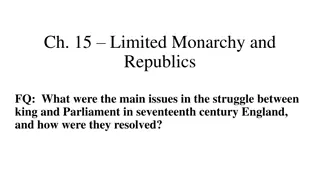Social and Historical Background of Early 20th Century England
The early 20th century in England was marked by significant events such as the reigns of Edward VII and George V, the Boer War, World War I, and the rise of the political left during the economic depression of the 1930s. The period also saw the abdication of Edward VIII and the reign of George VI during World War II, leading to the transformation into the Commonwealth of Nations.
Download Presentation

Please find below an Image/Link to download the presentation.
The content on the website is provided AS IS for your information and personal use only. It may not be sold, licensed, or shared on other websites without obtaining consent from the author. Download presentation by click this link. If you encounter any issues during the download, it is possible that the publisher has removed the file from their server.
E N D
Presentation Transcript
2020-2021 Academic Year Fall- Term N 405 Optional (Contemporary English Novel)
Course Outline Social and historical background (early 20thcentury) 1. week 2. week 3. Week Social and historical background the English novel in the 20thand 21stcentury, A review of the literary movements affecting the novel (modernism, social realism, angry young man movement) 4.Week Post modernism, Feminist novel, 5.Week post-colonial fiction, ecofeminsim 6.Week The Lord of the Flies by William Golding 7. Week 8.Week 9.Week 10.Week 11.Week 12Week 13.Week 14.Week The Lord of the Flies by William Golding The Lord of the Flies by William Golding Mid-Term The Lord of the Flies by William Golding The Lord of the Flies by William Golding Enigma by John Fowles Enigma by John Fowles Enigma by John Fowles The Pelican Guide to English Literature: the Present, Boris Ford (ed.) Penguin Boks, London,1990 Lord of The Flies, W.Golding, Penguin, 1962/2016 The Cambridge Companion to British Fiction since 1945, D. James (ed.), CUP, 2015 Sources The Novel Today: Contemporary Writers on Modern Fiction, Malcolm Bradbury, Fontana Press, London,1990 Contemporary British Novelists, Nick Rennison, Routlege, 2005 Critical Theory Today: A User-Friendly Guide, Lois Tyson, Routledge, 2006 Beginning Theory: An Introduction to Literary and Cultural Theory, MUP, 2009 Fields of Vision, Vol:2, D. Delaney, C. Ward, C.R. Fiorina, Longman, 2003
Social and Historical period Early 20th century After the death of Queen Victoria in 1901, Edward VII came to the throne and ruled England until 1910. The Boer War (1899-1902). The British wanted to establish political and economic control over the Boer republics of South Africa.
George V came to the throne in 1910. George V s reign witnessed the WW I (Great War). In 1917 he adopted the family name Windsor, replacing the Germanic Saxe-Caburg-Gotho because of his anti-German feeling. The Easter Rising in Dublin in 1916 resulted in the establishment of the Irish Free State
After the WWI, economic depression and unemployment led the majority of young intellectuals into political left. Therefore the 1930s were called the Red decade
After the death of George V, Edward VIII became king. He is the only British sovereign to abdicate voluntarily. Edward VIII stepped down in 1936 to marry Wallis Simpson
Edwards brother George VI became king in 1936. He was the king during WWII. During his reign transformed into the Commonwealth of Nations. He abandoned title Emperor of India the British Empire




